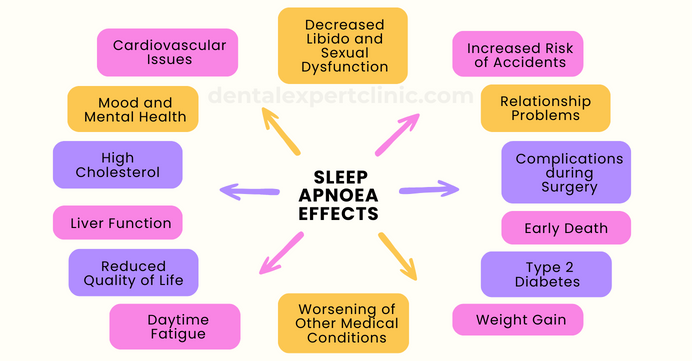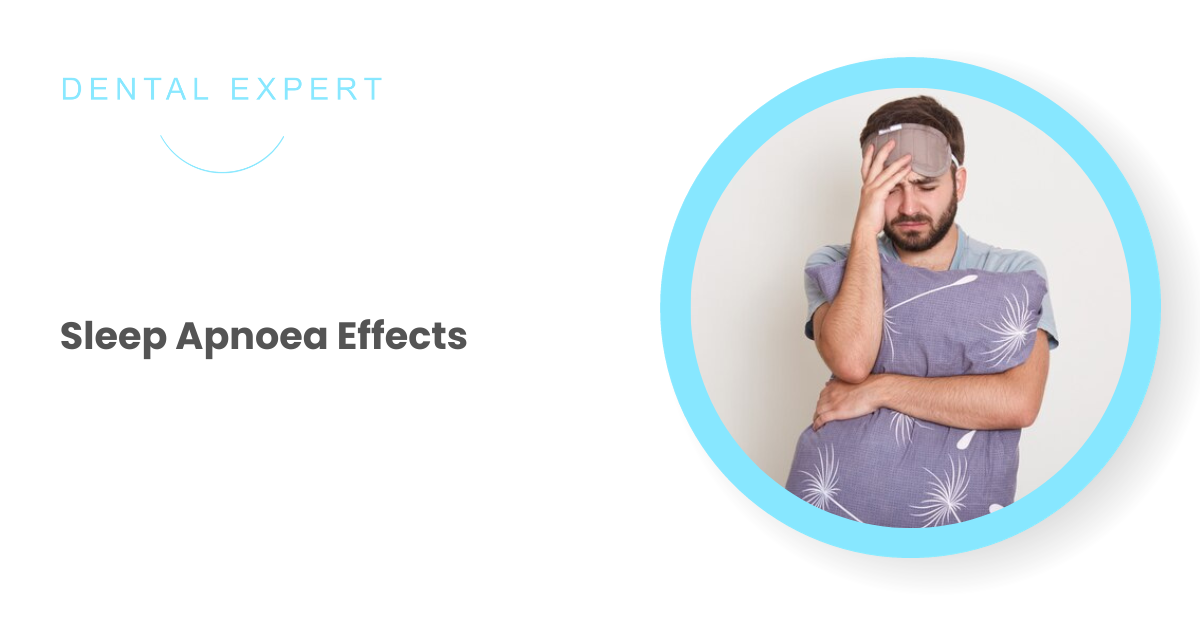Sleep apnoea is a term used for lack of air reaching the lungs during sleep, characterized by gasping for air.
Sleep apnoea is a common, dangerous yet often undiagnosed sleep disorder that can disrupt your sleep and have significant health implications. Sleep apnoea, if left untreated, can have various negative effects on an individual’s overall health and is a leading cause for untimely death.
The Effects of Sleep Apnea on the Body
Some of the potential effects and complications associated with sleep apnoea include:

- Cardiovascular Issues: Sleep apnoea is linked to an increased risk of several cardiovascular problems, including:
- High Blood Pressure (Hypertension): Frequent interruptions in breathing during sleep can cause increased blood pressure, which can strain the heart.
- Heart Disease: Sleep apnoea is associated with an increased risk of heart disease, including arrhythmias, heart attacks, and heart failure.
- Stroke: The decreased oxygen levels in the blood can lead to a higher risk of strokes.
- Type 2 Diabetes: Sleep apnoea is associated with insulin resistance, which can increase the risk of developing type 2 diabetes.
- Mood and Mental Health: Sleep apnoea can contribute to mood disturbances, including irritability, anxiety, and depression. It may also impair cognitive function and memory.
- Weight Gain: There is a bidirectional relationship between obesity and sleep apnoea. Obesity can increase the risk of developing sleep apnoea, and sleep apnoea can make it harder to lose weight.
- High Cholesterol: High Cholesterol is usually an outcome of sleep apnoea.
- Liver Function: Elevated liver enzymes and non-alcoholic fatty liver disease are more common in individuals with sleep apnoea.
- Reduced Quality of Life: Sleep apnoea can lead to a reduced quality of life due to chronic fatigue, difficulty concentrating, and the emotional toll of living with a chronic condition.
- Daytime Fatigue: Individuals with sleep apnoea often experience excessive daytime sleepiness, which can lead to decreased alertness, concentration problems, and an increased risk of accidents, such as car crashes.
- Increased Risk of Accidents: Excessive daytime sleepiness from sleep apnoea can lead to an increased risk of accidents, including work-related accidents and motor vehicle accidents.
- Relationship Problems: Loud snoring and frequent awakenings due to sleep apnoea can strain relationships and lead to social difficulties.
- Decreased Libido and Sexual Dysfunction: Sleep apnoea can contribute to a reduced interest in sex and sexual dysfunction.
- Worsening of Other Medical Conditions: Sleep apnoea can worsen existing medical conditions, including asthma and chronic obstructive pulmonary disease (COPD).
- Complications during Surgery: If you have sleep apnoea and undergo surgery, there’s an increased risk of complications related to anaesthesia and the surgery itself.
- Early Death: On account of it toll on different critical organs on the body, untreated sleep apnoea is known to cause early death.
You can also read: Managing Sleep Apnoea : For Restful Nights
Managing sleep apnoea is crucial for both your sleep quality and overall health.
It’s important to note that the effects of sleep apnoea can be significantly reduced or even eliminated with appropriate diagnosis and treatment. If you suspect you have sleep apnoea or are experiencing any of the associated symptoms and complications, it’s essential to consult a healthcare professional like Dr. Denzil Albuquerque or a sleep specialist for evaluation and management.
Dr. Denzil Albuquerque (BDS, MDS, FOFP-USA), is a specialist in Dental Sleep Medicine. He has completed his fellowship in Oro-Facial pain, Headaches and Dental Sleep Medicine from the prestigious Roseman University, USA.
Schedule an appointment now at Dental Expert or request for an online consultation with Dr. Denzil Albuquerque, for professional advice on management of Sleep Apnoea.

